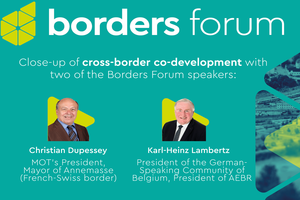News
BORDERS FORUM: the programme, registration and letting the first speakers have their say
March 2022
Every month until June, the MOT is letting Borders Forum speakers have their say about a topic that will be at the heart of the discussions.
Click here to view the full programme of the event and register online.
Download the first press release.
This month, it is the turn of Christian Dupessey, the MOT’s President, Mayor of Annemasse and President of the Metropolitan Pole of the French Genevois, and Karl-Heinz Lambertz, President of the German-Speaking Community of Belgium and President of the Association of European Border Regions (AEBR), on the subject of cross-border co-development.
What do cross-border territories represent for you?
Christian Dupessey: They are real shared living areas. The border should not separate or impede; on the contrary, it should foster working relations, journeys by public transport, the fight against crime, the emergence of a cross-border culture policy and romantic and family life. They are also territories of experimentation and continental integration promoting peace, in Europe and elsewhere.
Karl-Heinz Lambertz: It is the territory I personally have lived in for 70 years. And I have held political responsibilities there for over 40 years. For me, they are a veritable laboratory and a powerful engine for European integration that our continent is so in need of, today and in the future even more than in the past.
What are the priorities in cross-border employment areas for economic recovery in the post-Covid environment?
Christian Dupessey: The central issue in the Greater Geneva region is to make permanent the measures taken to regulate teleworking for cross-border workers. The MOT shared its experience in this regard during the pandemic and will continue to do so. We also need to find new equilibria in these areas with respect to training and employment sectors. We cannot carry on as before. If I take the example on our border of healthcare workers, France cannot continue to provide most of their training without being able to benefit from these professionals in its own hospitals because they have been lured to the other side of the border. In the hotel sector, everyone will only benefit from the economic recovery if it allows a rebalancing of the distribution of jobs.
Greater Geneva is a cross-border conurbation of more than a million inhabitants that straddles the Ain and Haute Savoie Departments (France) and the Canton of Geneva and the District of Nyon (Switzerland). To address the constant increase in flows of cross-border workers (which numbered over 90,000 at the end of 2020 in the Canton of Geneva), the French and Swiss stakeholders cooperate on structural projects such as the Léman Express, the first Franco-Swiss cross-border regional rail network that began operating in 2019, or the cross-border greenway linking Annemasse and Geneva. During the pandemic, the use of teleworking by cross-border workers was an answer to the problems created by the closure of the border.
Karl-Heinz Lambertz: Despite the considerable efforts undertaken over decades to facilitate cross-border mobility linked to employment and economic development, the Covid-19 crisis triggered an immediate reflex to close borders on the part of governments. It was only little by little that this process was reversed. It is vital to protect cross-border areas from the harmful impacts of this reflex and to make them resilient to this kind of reaction, in order to durably consolidate European cohesion along national borders.
What are you hoping from the 2022 Borders Forum?
Christian Dupessey: That it continues the reflections and work initiated at the first edition, which was a success. And that it underscores even more the role of respect for borders that bring people together to ensure peace, at a time when we express our solidarity with Ukraine. Bringing together local, national and European players over two days allows us to share our experiences, but also to begin a new cross-border chapter that will learn, I hope, the lessons of the pandemic. France’s presidency of the EU Council should help us to make heard the importance of cross-border issues, which should be incorporated into the design of French and European public policy. Much remains to be done – so see you in Paris and online on 21-20 June!
Karl-Heinz Lambertz: The Borders Forum is an excellent opportunity to allow the voices of border regions be heard, to place them at the heart of European concerns and to send out a strong message at a decisive point in the evolution of the European Union. It also provides a fine opportunity to display the value added of the enhanced cooperation between the MOT, CESCI and the AEBR based on the Strasbourg Declaration of 7 October 2021.
More info on the Borders Forum website.
Back to list
